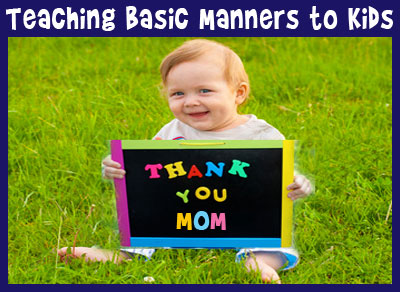Have you ever visited someones home and come away feeling disgusted by the behaviour of the children there? Here are some manners that every child should learn.While it is true that no one is perfect, children are expected to conform to at least certain basic behavioural norms. For example, greeting guests and not interrupting an ongoing conversation between adults are rules that every child must follow, no matter how young he is. In todays world, it is easy to send your child for etiquette classes. There he will learn how to carry on a conversation, which cutlery to use for certain foods, and a whole host of other social skills. However, teaching your child his manners is a task that should begin at home. In this articleManners are ImportantWaiting his turnGreeting peopleSaying please and thank you Manners are Important Society is such that an individual is judged on the basis of his social skills. Manners play a big role in social behaviour. They influence peoples perceptions and behaviour towards an individual. Good manners indicate a good upbringing and are a mark of good breeding. Each set of circumstances has its own accepted manners. However, all manners are based on the same principal; that is consideration for other people and being mindful of their feelings. In each scenario, there are three main criteria to determine if an individual has good manners. These are diplomacy, hospitality, and tact. Teach Children when they are Young Teaching a child how to behave should begin from the time your child is able to speak. A few basic manners are listed below. Waiting his turn If you are busy speaking to someone else and your child wants to speak to you, he should wait quietly, until you have finished your conversation. If your child interrupts you, explain to him that you are busy and ask him to wait. If he persists, tell him that when many people speak at the same time, no one can be understood. If your child is waiting to speak to you, reach out your hand to touch him and let him know you are aware of his presence. When you do listen to him, give him your complete attention. This will teach your child that waiting to speak to you ensures you will not be distracted when his turn comes. Greeting people Teach your child to greet a visitor to your home. When he is young, your child need not shake hands with a visitor. A simple hello will suffice. A child older than five can be taught to shake an adults hand while greeting him. Although this is a typical Western form of greeting someone, it is also accepted in India. Even if he is shy around people he is meeting for the first time, he should still greet them politely to make them feel welcome. The same greeting behaviour should be followed when he visits someones home. Have your child greet every member of the household. How a person is greeted will sometimes depend on the level of formality you follow. In most Indian households, he would be expected to touch the feet of the adults, as a mark of respect. Make sure you teach your child the different forms of greeting people. Also, guide him on the method to use in each situation. Saying please and thank you If your child is asking for something, he should always say please. If he forgets, have him repeat his request again and remind him that he forgot to say please. Explain to him that when he asks for something without saying please, it appears like a demand, rather than a request. Your child should always thank a person when he receives a gift from someone and when someone complies with his request. He should say thank you even when someone compliments him for any reason. Teach your child manners using positive reinforcement techniques. Praise your child when he does something right. If he makes a mistake, gently explain to him why he is wrong and show him the correct way to act. Remember though, that manners cannot be learned in a single day. You will need to keep reminding your child to mind his manner and gently reprimand him when he behaves undisciplined. This will ensure that he grows up into a charming, well-mannered adult. At what age do you think children should be taught their manners? Is it better to teach them at home or send them for classes to a professional? Which are the basic manners that every child should know? Discuss here.
Have you ever visited someone's home and come away feeling disgusted by the behaviour of the children there? Here are some manners that every child should learn.
While it is true that no one is perfect, children are expected to conform to at least certain basic behavioural norms. For example, greeting guests and not interrupting an ongoing conversation between adults are rules that every child must follow, no matter how young he is.
In today's world, it is easy to send your child for etiquette classes. There he will learn how to carry on a conversation, which cutlery to use for certain foods, and a whole host of other social skills. However, teaching your child his manners is a task that should begin at home.
Manners are Important
Society is such that an individual is judged on the basis of his social skills. Manners play a big role in social behaviour. They influence people's perceptions and behaviour towards an individual. Good manners indicate a good upbringing and are a mark of good breeding.
Each set of circumstances has its own accepted manners. However, all manners are based on the same principal; that is consideration for other people and being mindful of their feelings. In each scenario, there are three main criteria to determine if an individual has good manners. These are diplomacy, hospitality, and tact.
Teach Children when they are Young
Teaching a child how to behave should begin from the time your child is able to speak. A few basic manners are listed below.
Waiting his turn
If you are busy speaking to someone else and your child wants to speak to you, he should wait quietly, until you have finished your conversation. If your child interrupts you, explain to him that you are busy and ask him to wait. If he persists, tell him that when many people speak at the same time, no one can be understood.
If your child is waiting to speak to you, reach out your hand to touch him and let him know you are aware of his presence. When you do listen to him, give him your complete attention. This will teach your child that waiting to speak to you ensures you will not be distracted when his turn comes.
Greeting people
Teach your child to greet a visitor to your home. When he is young, your child need not shake hands with a visitor. A simple 'hello' will suffice. A child older than five can be taught to shake an adult's hand while greeting him. Although this is a typical Western form of greeting someone, it is also accepted in India. Even if he is shy around people he is meeting for the first time, he should still greet them politely to make them feel welcome.
The same greeting behaviour should be followed when he visits someone's home. Have your child greet every member of the household. How a person is greeted will sometimes depend on the level of formality you follow. In most Indian households, he would be expected to touch the feet of the adults, as a mark of respect. Make sure you teach your child the different forms of greeting people. Also, guide him on the method to use in each situation.
Saying 'please' and 'thank you'
If your child is asking for something, he should always say please. If he forgets, have him repeat his request again and remind him that he forgot to say please. Explain to him that when he asks for something without saying please, it appears like a demand, rather than a request.
Your child should always thank a person when he receives a gift from someone and when someone complies with his request. He should say thank you even when someone compliments him for any reason.
Teach your child manners using positive reinforcement techniques. Praise your child when he does something right. If he makes a mistake, gently explain to him why he is wrong and show him the correct way to act. Remember though, that manners cannot be learned in a single day. You will need to keep reminding your child to mind his manner and gently reprimand him when he behaves undisciplined. This will ensure that he grows up into a charming, well-mannered adult.
At what age do you think children should be taught their manners? Is it better to teach them at home or send them for classes to a professional? Which are the basic manners that every child should know? Discuss here. 































